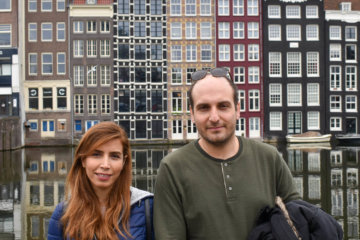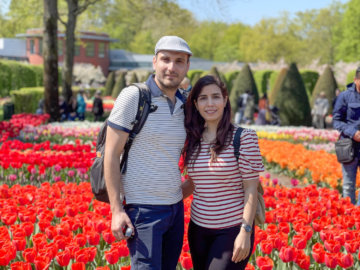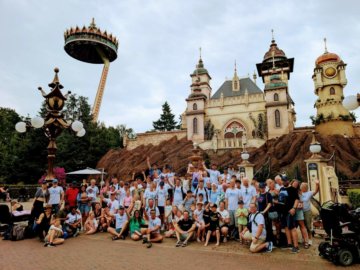Note: please scroll down or click here for the English version of this article
We zijn er ons meestal niet echt van bewust hoe fijn het is dat we mogen zeggen en schrijven wat we vinden. Denk aan de vele demonstraties en stakingen, duizenden vlaggen die al maanden op hun kop hangen maar ook aan de vuurspuwende teksten op de verschillende media. En hebben we de leeftijd van huisje-boompje-beestje bereikt, vinden we het normaal dat we een toekomst uitstippelen die dan meestal een grote kans van slagen heeft. En hoewel we weet hebben van oorlogen en de gevolgen daarvan, hebben wij niet onder vuur gelegen of geschuild toen er bommen of raketten neervielen. Hoe anders is dit voor het Iraanse echtpaar Asal en Amir. Zij besloten huis en haard te verlaten omdat een steeds strenger regime hen niet alleen vrijheid ontzegt, maar ook de kans op een toekomst ontneemt.
De 36-jarige Asal Khoshnavataher groeide samen met haar ouders, 3 broers en 5 zussen op in de kleine Iraanse stad Dehdasht. Het gebied kent wel 4 seizoenen maar er valt minder water en dus is de natuur niet zo uitbundig en groen als hier. Het dagelijks leven speelt zich zomers vanwege de hoge temperaturen vooral binnen af. Gelukkig brengt de airconditioning daar verkoeling. Haar even oude echtgenoot Amir Tavakoli daarentegen groeit op in het grotere en vooral industriële Saveh waar veel migranten naar toe trekken, op zoek naar een baan en een betere toekomst. Amir: ‘Maar ik ben geboren in Teheran tijdens de Iran-Iraq oorlog en wel juist op een dag dat we onder raketvuur lagen en er bommen vielen. Mijn moeder ging ondergronds om te schuilen en is daar ook bevallen. Zo snel mogelijk daarna zijn we gevlucht naar Saveh. Mijn geboortedatum is daarom ook niet correct. Het is officieel 21 maart maar ik ben op 17 maart geboren.’
Ontmoeting in Qom
Allebei verlaten ze op hun achttiende het ouderlijk huis om te gaan studeren. Asal doet haar bachelor aan de Technische Universiteit in Isfahan en Amir de zijne in Kermanshah. Voor hun master in IT Engineering verhuizen ze naar de in 1980 door de staat opgerichte universiteit in de stad Qom (120 km ten zuiden van Teheran) en daar zijn ze klasgenoten, krijgen een relatie en op hun 31ste, voor hun komst naar Nederland, trouwen ze. Asal: ‘Amir ging na de master in Teheran werken en vond daar voor mij ook een baan. Ik heb bij twee verschillende bancaire instanties gewerkt en ervaarde mijn werk, in tegenstelling tot Amir, als plezierig met gewone kantooruren, eigenlijk net als hier. Samen met een vriendin deelde ik een appartement.’

Toekomst
Wonend en werkend in Teheran maken Asal en Amir toekomstplannen. Amir: ‘Ik moest eerst nog mijn verplichte militaire dienst vervullen en gelukkig kwam ik op een goede plek terecht en niet ergens in de woestijn. Van 8 tot 4 werkte ik toen onbezoldigd twee jaar lang als software engineer voor een gouvernementele organisatie, om van 4 tot 6 dan nog betaald door te mogen werken.’ Later hebben ze allebei goed betaalde banen en de vraag is dan wanneer en waarom het zaadje ontspringt om het land als kennismigrant te gaan verlaten. Asal antwoordt: ‘Je bent in Iran nooit zeker van je toekomst want elk moment kan er iets gebeuren waardoor je plannen in duigen vallen.’ Amir geeft hier een voorbeeld van: ‘We hadden geld gespaard om een aanbetaling voor een appartement in Teheran te doen en van de ene op de andere dag werd dat geld 60% minder waard en bleek dat geld nauwelijks genoeg om een aanbetaling voor een huurappartement te doen.’ Asal voegt nog toe dat ze graag wil dat eventuele kinderen in vrijheid, en niet in angst, op kunnen groeien.
Kennismigranten
Amir ervaarde zijn leven en werk in Teheran als zwaar. ‘Teheran is een immense stad met veel luchtvervuiling. Mijn baan was erg intensief, ik weigerde in het weekend te werken en dat gaf de nodige problemen. Je moet je er bewust van zijn dat een dictatoriaal regime invloed heeft op alle aspecten van je leven. Wat je zegt of zwijgt kan cruciaal zijn, op je werk maar ook elders. Langzaam maar zeker zijn we samen gaan uitzoeken hoe het werkt om Iran te verlaten. Dat was voor ons als een black box, want je moet alles zelf uitzoeken en doen. Ik leerde hoe ik een goed CV moest maken en kreeg later via recruiters aanbiedingen uit Duitsland en Nederland. Het werd uiteindelijk een baan bij Travix in Amsterdam dat jullie kennen van o.a. cheaptickets.nl. Ik vond het wel erg dat ik van Asal moest vragen haar goede baan op te zeggen en bovendien heeft ze ook last van vliegangst.’ Amir prijst zich gelukkig dat hij vanwege zijn IT achtergrond in 2019 het land mocht verlaten. Verdrietig zegt hij: ‘Omdat de situatie in Iran steeds meer verslechtert, willen bijna alle hoogopgeleide mensen het land uit, ook onze familieleden, maar behalve mijn jongere zus wiens man developer is, lukt dat bijna niemand.’

Eonics
Als Asal een aantal maanden in Nederland is, komt zij via familielid Parsa, freelancer bij Eonics, in contact met ons. ‘Ik had een interview met Jan Peter en mocht daarna als stagiair aan de slag bij NIXZ. In het eerste jaar heb ik mezelf Engels geleerd en daarna ging ik op Nederlandse les bij Judy. Inmiddels heb ik mijn inburgeringsexamen gehaald en werk als senior consultant bij Uturn in Rotterdam.’ Amir is sinds kort ook bij Eonics aan de slag en wel bij BMW in Breda. Amir: ‘Na 3,5 goede jaren bij Travix heb ook ik onlangs voor Eonics als werkgever gekozen. Ik kende het natuurlijk via Asal en het voelt goed om nu ook bij die grote familie te horen. Dat het niet alleen gaat om geld verdienen, maar dat ze persoonlijke aandacht belangrijk vinden, dat trok me aan.’ Ook Asal bevalt het bij Eonics vanwege die reden maar zij noemt ook de vrijheid om overal te kunnen werken waardoor haar werk nooit saai wordt, als relevant. ‘Dat ik bij een start-up als U-turn veel nieuwe technologieën kan toepassen, verrijkt mijn werk.’
Vrijheid
Twee jaar geleden kochten ze een eigen woning in Den Haag, vlakbij Wateringen waar de ouders van Amir al een aantal maanden op bezoek waren. Momenteel is Asal bezig met de papierwinkel om haar moeder en zus hierheen te krijgen voor vakantie maar dit is een proces van maanden eer alle formaliteiten rondom hun visa afgerond zijn.Gelukkig is er via de telefoon wel dagelijks contact met hun dierbaren mogelijk.
Voor Asal en Amir is vrijheid meer dan een woord, geenszins vanzelfsprekend maar vooral een kostbaar goed. Het stelt hen in staat een toekomst uit te stippelen en zich overal vrijelijk over uit te spreken, thuis en op kantoor. Maar hoewel het leven ze toelacht in Nederland, is er wel altijd een schaduwkant: het missen van je familie, vooral tijdens feestdagen in je eigen land zoals Nieuwjaar op 21 maart. Dat is de hoge prijs die zij betalen voor hun toekomst in vrijheid, een vrijheid die wij vaak als vanzelfsprekend ervaren.
Judy Wagenaar – maart 2023
One of Us: Leaving Hearth and Home for Freedom
Note: please find accompanying pictures in the Dutch version above
Here in the Netherlands, we are usually not really aware of how nice it is that we are allowed to say and write what we think. Think of the many demonstrations and strikes, thousands of flags hanging upside down for months, and the fiery texts on various media. And when we reach adulthood, we think it’s normal to plan a future that usually has a high chance of actual success. Although we know about wars and their consequences, we have not been under fire or taken shelter when bombs or missiles fell. This is very different for the Iranian couple Asal and Amir. They decided to leave their home and hearth because an increasingly strict regime not only denies them freedom but also takes away their chance for a future.
The 36-year-old Asal Khoshnavataher grew up with her parents, 3 brothers, and 5 sisters in the small Iranian town of Dehdasht. The area has four seasons, but there is less rainfall, so nature is not as lush and green as it is here. Due to high temperatures, daily life in summer mainly takes place indoors. Fortunately, the air conditioning provides some relief. Her equally old husband Amir Tavakoli, on the other hand, grew up in the larger and more industrial Saveh, where many migrants are drawn to in search of a job and a better future. Amir: “But I was born in Tehran during the Iran-Iraq war, right on a day when we were under rocket fire, and bombs were falling. My mother went underground to take shelter and gave birth there. As soon as possible after that, we fled to Saveh. My date of birth is therefore not correct. It is officially March 21, but I was born on March 17.”
Meeting in Qom
Both left their parental home at the age of eighteen to study. Asal does her bachelor’s degree at the Technical University in Isfahan and Amir his in Kermanshah. For their master’s degree in IT Engineering, they move to the state-founded university in the city of Qom (120 km south of Tehran), where they become classmates, start a relationship, and marry at the age of 31, before coming to the Netherlands. Asal: “Amir went to work in Tehran after the master’s degree and found a job for me there too. I have worked at two different banking institutions and, unlike Amir, enjoyed my work with regular office hours, just like here. I shared an apartment with a friend.”
Future
Living and working in Tehran, Asal and Amir make future plans. Amir: “I first had to complete my mandatory military service, and luckily I ended up in a good place and not somewhere in the desert. From 8 to 4, I worked unpaid for two years as a software engineer for a government organization, and then from 4 to 6, I was allowed to work for pay.” Later, they both have well-paying jobs, and the question is when and why the seed to leave the country as a knowledge migrant springs up. Asal answers: “You are never sure of your future in Iran because something can happen at any moment that ruins your plans.” Amir gives an example: “We had saved money to make a down payment on an apartment in Tehran, and from one day to the next, that money became 60% less valuable, and it was barely enough to make a down payment on a rental apartment.” Asal adds that she wants any children they might have to grow up in freedom, not fear.
Skilled Migrants
Amir experienced his life and work in Tehran as difficult. “Tehran is an immense city with a lot of air pollution. My job was very intensive; I refused to work on weekends, which caused problems. You have to be aware that a dictatorial regime influences all aspects of your life. What you say or remain silent about can be crucial, both at work and elsewhere. Slowly but surely, we started figuring out together how to leave Iran. It was like a black box for us since we had to research and do everything ourselves. I learned how to create a good CV and later received job offers from Germany and the Netherlands through recruiters. Eventually, I took a job at Travix in Amsterdam, which you know from cheaptickets.nl, among others. I felt bad asking Asal to quit her good job, and she also suffers from a fear of flying.” Amir considers himself fortunate that, due to his IT background, he was allowed to leave the country in 2019. Sadly, he says, “As the situation in Iran deteriorates further, almost all highly educated people want to leave the country, including our family members. But besides my younger sister, whose husband is a developer, almost nobody succeeds.”
Eonics
A few months after Asal arrives in the Netherlands, she gets in touch with us through her relative Parsa, a freelancer at Eonics. “I had an interview with Jan Peter and was allowed to work as an intern at NIXZ. In the first year, I taught myself English and then took Dutch lessons with Judy. I have since passed my integration exam and am working as a senior consultant at Uturn in Rotterdam.” Amir recently joined Eonics as well, working at BMW in Breda. Amir: “After 3.5 good years at Travix, I recently chose Eonics as my employer. I knew about it through Asal, and it feels good to be part of that big family now. The fact that it’s not just about making money, but that they value personal attention, appealed to me.” Asal also likes working at Eonics for that reason, but she also mentions the freedom to work anywhere, which keeps her job interesting. “Being able to apply many new technologies at a start-up like U-turn enriches my work.”
Freedom
Two years ago, they bought a house in The Hague, near Wateringen, where Amir’s parents had already been visiting for several months. Asal is currently working on the paperwork to bring her mother and sister here for a vacation, but it’s a process that takes months before all the formalities surrounding their visas are completed. Fortunately, daily contact with their loved ones is possible via phone.
For Asal and Amir, freedom is more than just a word; it is by no means self-evident but, above all, a precious commodity. It enables them to plan their future and express themselves freely everywhere, both at home and in the office. But even though life is smiling upon them in the Netherlands, there is always a downside: missing their family, especially during holidays in their own country, such as New Year’s on March 21st. That is the high price they pay for their future in freedom, a freedom that we often take for granted.


